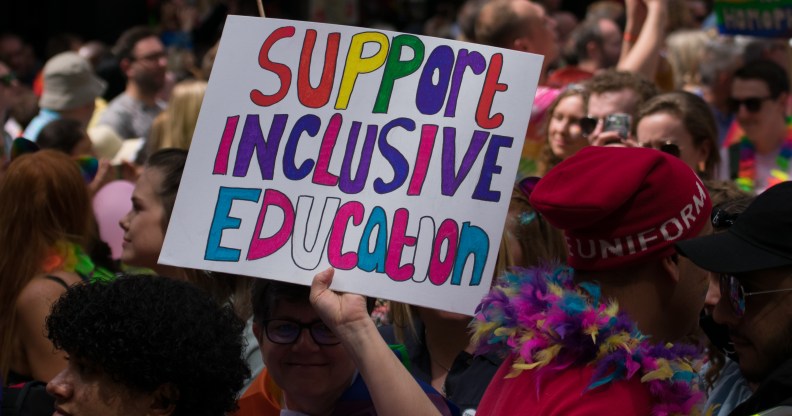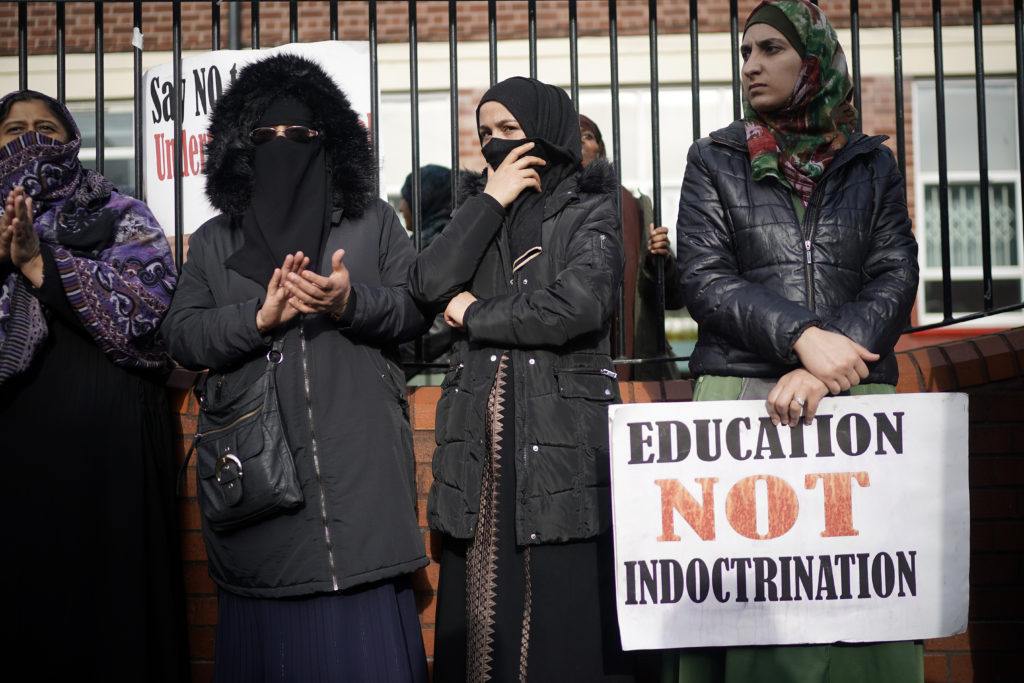Protesters claim LGBT inclusive relationship education will teach infants about masturbation

Thousands of members of the LGBTQ community gathered today for the Birmingham Pride parade on May 25, 2019, in Birmingham, United Kingdom. (Jim Wood / Barcroft Media via Getty Images)
Leaflets are being distributed at schools in east London claiming that LGBT+ inclusive education is teaching infant school kids about masturbation.
The spread of disinformation about inclusive education comes as protesters seek to replicate tactics that led to months of unrest at schools in Birmingham.
Leaflets claim infants will ‘be encouraged to masturbate’ by LGBT+ inclusive lessons.
The BBC’s Victoria Derbyshire programme found a leaflet being distributed to parents in Newham, east London, claiming that lessons would promote “transgenderism and homosexual lifestyles” and “pervert the course of natural child development”.
The leaflet also claims: “Children in infant school will be encouraged to masturbate. First sexual experiences will be encouraged by the age of 12.”
Newham Labour councillor Rohit K. Dasgupta spoke out against the campaign, warning that activists were using private WhatsApp groups to coordinate attacks on inclusive education.
He said: “There has been a lot of intimidation that councillors have faced over here, in terms of both party members and residents living in their ward, who come and question them.
“I think there’s a lot of misinformation, that’s the main problem.”
The group behind the leaflet, School Gate Campaign, told the BBC it would remove the statement about masturbation but “stood by” its other claims.

Parents, children and protesters demonstrate against the ‘No Outsiders’ programme, which teaches children about LGBT rights, at Parkfield Community School on March 21, 2019 in Birmingham, England. (Christopher Furlong/Getty Images)
The activists insisted that “the majority of parents do not agree with the current approach to sex education, which demands ever more explicit sex education at ever younger ages”.
Their website continues to falsely claim that resources “introduce nudity, graphic images and terms like anal intercourse and masturbation to juniors” and that “sexual intercourse will be encouraged from the age of 13”.
The group also claims: “Teaching children from a very early age, that they might be one of two percent of the population who have sexual love for their own sex, hijacks and potentially perverts the course of natural child development.
“If a young girl ‘loves’ her same-sex best friend, she could be led to think, utterly erroneously, ‘I am gay.'”
The School Gate Campaign website also includes a link to UKIP-affiliated campaign group Support 4 the Family, which has previously distributed literature comparing gay people to Hitler and the Yorkshire Ripper.
Birmingham school protests coincided with hate crimes spike.
The months-long protests targeted at Parkfield Primary School and Anderton Park Primary School in Birmingham coincided with a doubling in homophobic hate crimes around the city.
West Midlands Police warned that the “huge spike in homophobic hate crime reports… coincided with when the protests started outside the schools”.
Meanwhile, the government has come under fire for its handling of the situation.
Parkfield academy boss Hazel Pulley has accused the Department of Education of pressing behind-the-scenes for an LGBT+ inclusive anti-bullying programme to be dropped.
The National Association of Head Teachers and National Education Union have urged the government to make guidance clearer and emphasise its support for LGBT-inclusive education.
The Department of Educaiton said in a statement: “We want pupils growing up in the 21st century to understand the world around them and know what positive and safe relationships look like, which is why we’re making relationships education compulsory.
“At primary school, this starts with family and friends, how to be kind, and recognising the difference between online and offline friendships. Schools should consult with parents when developing the content they use, and it must be delivered in an age-appropriate way.”

